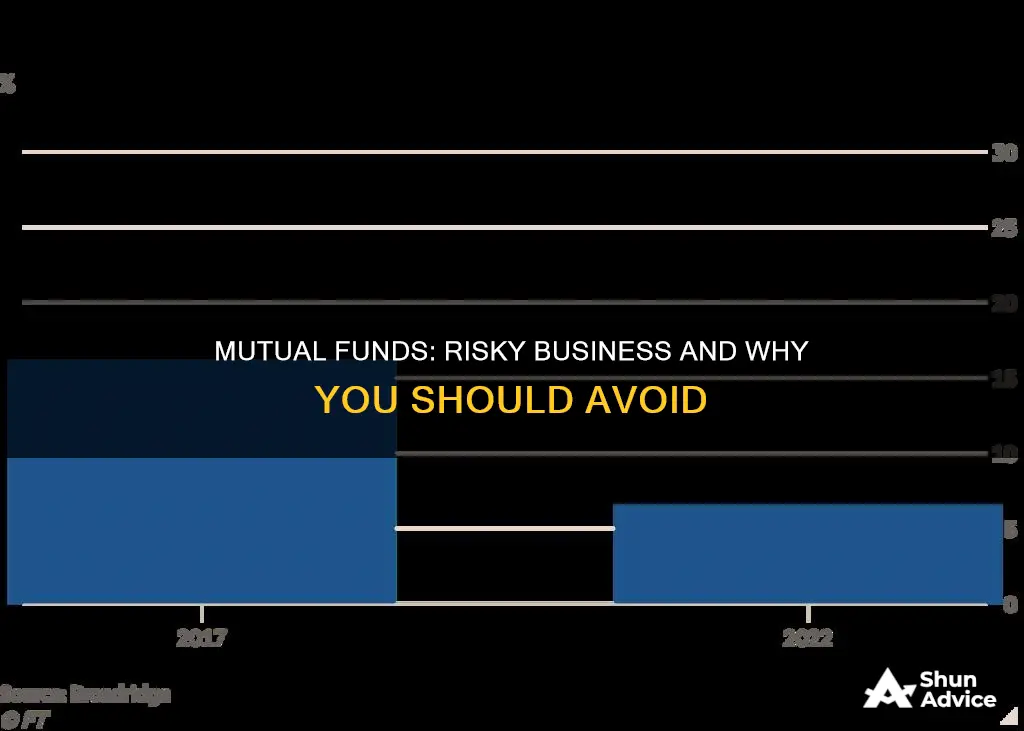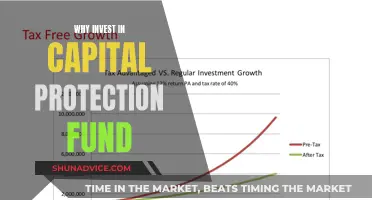
Mutual funds are a popular investment option for those who want to grow their wealth without the effort of stock-picking. They are investment vehicles that pool money from multiple investors to buy a diversified portfolio of stocks, bonds, or other securities. However, there are several reasons why one should not invest in mutual funds. Firstly, mutual funds are expensive to own, with significantly higher expense ratios than other investment options such as Exchange-Traded Funds (ETFs). Mutual funds also have additional fees, such as sales loads, commissions, and early withdrawal penalties. These fees can significantly reduce investment returns over time. Secondly, mutual funds have significant barriers to exit, with specific rules and fees for early exits. Advisors may also discourage investors from selling their mutual funds, leading to investors holding onto their funds for too long and selling in a bad market environment. Thirdly, a large portion of mutual funds are actively managed, and most actively managed funds underperform index funds. This means that investors could achieve higher returns by investing in passively managed funds or ETFs. Fourthly, mutual funds have tax implications, particularly when owned outside of a retirement account. Actively managed funds can lose around 1% of fund performance annually due to taxes, and taxable events can occur when major changes happen to the fund. Lastly, mutual funds offer limited control over investment choices, as investors must put their trust in fund managers to make the right decisions on their behalf. This can be frustrating for investors who prefer to have a say in where their money is invested. In summary, while mutual funds offer instant diversification and professional management, there are several drawbacks to consider before investing.
| Characteristics | Values |
|---|---|
| High fees | Mutual funds have high fees, including expense ratios, 12b-1 fees, and upfront costs. |
| Poor performance | Mutual funds often underperform the market, with a high percentage of professional money managers failing to beat their respective benchmarks. |
| Lack of transparency | Mutual fund holdings are only disclosed to investors quarterly, so investors may not always know what they own. |
| Taxable events | Actively managed mutual funds can result in taxable events for investors, even when the fund doesn't have any gains. |
| Diluting effect of diversification | The diversification of a mutual fund can sometimes dilute the positive returns. |
| Loss of principal | There is a potential for loss of principal as portfolio managers cannot guarantee the performance of the fund. |
What You'll Learn
- Mutual funds are not a good investment if you want to avoid fees
- You may prefer to avoid the risk of losing your principal
- Mutual funds are not a good option if you want short-term gains
- You may not want to rely on a fund manager to make investment decisions
- You may want to avoid the potential diluting effect of diversification

Mutual funds are not a good investment if you want to avoid fees
Mutual funds charge what is known as an "expense ratio" as payment for managing the fund. This is a measure of the cost of managing the fund, expressed as a percentage of the total assets invested in the fund. This is calculated annually and is typically paid out of the fund's assets, so you won't be billed for it directly. However, it will reduce your returns, and the higher the expense ratio, the more it will eat into your profits.
There are two main types of fees associated with mutual funds: annual fund operating expenses and shareholder fees. Annual fund operating expenses are ongoing fees that cover the cost of paying managers, accountants, legal fees, marketing, and other administrative costs. Shareholder fees, on the other hand, are one-time costs incurred when buying or selling mutual fund shares, such as sales commissions.
Actively managed funds, where fund managers try to beat the average market returns, tend to have higher fees than passively managed funds, which aim to mirror the returns of a benchmark stock index. Actively managed funds require more human intervention and frequent trading of securities, which results in higher trading fees.
Mutual funds also have various other fees, such as management fees, 12b-1 fees (which cover marketing and distribution expenses), redemption fees (for selling shares within a short period of buying), exchange fees, account fees, and purchase fees.
While some fees might seem small, they can add up to substantial amounts over time. For example, a 1% annual fee on a $10,000 investment with a 7% annual return will result in a final value of around $1.1 million after 45 years, with fees costing approximately $480,000. Choosing a fund with a lower fee of 0.5% would result in a final value of $1.3 million, with fees of $216,000.
Therefore, it is essential to understand the different types of fees associated with mutual funds and to carefully consider the potential impact of these fees on your investment returns over the long term.
Best ELSS Funds to Invest in India: Smart Picks
You may want to see also

You may prefer to avoid the risk of losing your principal
Investing in mutual funds is a popular option for many, but it's not without its risks. One of the potential drawbacks of investing in mutual funds is the possibility of losing your principal, which refers to the initial amount of money you invest. Here are some reasons why you may prefer to avoid the risk of losing your principal by investing in other vehicles:
- Potential for Loss: One of the primary risks associated with mutual funds is the potential for loss of principal. While mutual funds are managed by professionals, they cannot guarantee positive returns. The value of your investment can decrease, and you may lose some or all of your principal. This risk is inherent in any investment, but it's important to consider before committing your money.
- Diversification Impact: Diversification is often touted as a benefit of mutual funds, as they pool money from multiple investors to invest in a variety of stocks or bonds. However, this diversification can sometimes dilute the impact of positive returns. For example, if a single stock in the fund performs exceptionally well, its gains may not be fully reflected in the fund's overall return. This means that while diversification can reduce risk, it may also result in lower returns than if you had invested directly in the top-performing stocks.
- Long-Term Focus: Mutual funds are typically better suited for long-term investors. If you need access to your money in the short term (within three to five years), mutual funds may not be the best option. The returns over a shorter period, after accounting for fees, may not outweigh the initial investment. Therefore, if you're looking for a more liquid investment or need quick access to your funds, other options may be more suitable.
- Risk Tolerance: It's essential to assess your risk tolerance before investing in mutual funds. These funds can experience fluctuations in value, and there is always the potential for loss. If you are uncomfortable with the level of risk associated with mutual funds, there are alternative investment options available that may better align with your tolerance for risk.
- Alternative Investment Options: The introduction of exchanged-traded funds (ETFs) has provided investors with an alternative to mutual funds. ETFs offer many of the same benefits as mutual funds, including diversification and professional management, but with lower fees and increased transparency. ETFs also provide tax advantages due to their legal structure and investment style. Therefore, if you're concerned about the risks associated with mutual funds, ETFs could be a preferable option.
Remember, before making any investment decision, it's crucial to carefully consider your financial goals, risk tolerance, and time horizon. Consulting with a financial advisor can help you make informed choices that align with your specific circumstances.
Pension Funds: Where Are Your Retirement Savings Invested?
You may want to see also

Mutual funds are not a good option if you want short-term gains
Mutual funds are a popular investment option for those who are risk-averse. However, they may not be the best option for those seeking short-term gains. Here's why:
Long-term investment horizon
Mutual funds are typically designed for long-term investment goals. The value of your investment in mutual funds increases over time, and withdrawing your money too early may result in missing out on potential gains. While mutual funds can provide high double-digit returns, these returns are usually achieved over an extended period. If you're seeking quick profits, mutual funds may not be the ideal choice.
Lack of flexibility for short-term goals
Mutual funds are meant for investors with long-term financial objectives, such as retirement planning or saving for a child's education. The investment strategies and portfolio allocations of mutual funds are aligned with these long-term goals. If you have short-term financial targets, such as saving for a down payment on a house or an upcoming expense, mutual funds may not offer the necessary flexibility to access your funds when needed without incurring penalties or fees.
Potential for higher expenses
Mutual funds often come with various fees and expenses that can eat into your returns. These include high annual expense ratios, load charges, and 12b-1 fees. The impact of these fees is more pronounced in the short term, as they can quickly erode any potential gains. If you're looking for short-term gains, avoiding these expenses becomes crucial, and other investment options with lower fees might be more suitable.
Inability to time the market
Market timing is challenging, if not impossible. Mutual funds require a long-term commitment, and their performance can vary over time. If you're seeking short-term gains, you might be better off with more liquid investments that allow you to enter and exit the market quickly. With mutual funds, you're committing to a longer investment horizon, which might not align with your short-term goals.
Diluted returns
Due to regulations, mutual funds cannot have concentrated holdings, and their portfolios tend to be diversified across various sectors and asset classes. While this diversification reduces risk, it can also lead to diluted returns. If you're seeking short-term gains, you might prefer investing in individual stocks or sectors that are expected to perform well in the near term. Mutual funds, with their diversified approach, might not provide the level of returns you're aiming for in the short term.
In conclusion, while mutual funds offer a range of benefits, they may not be the best option for those seeking short-term gains. Other investment vehicles, such as exchange-traded funds (ETFs), short-term bond funds, or even high-yield savings accounts, might be more suitable for achieving your financial goals within a shorter time frame.
Vanguard Funds: Best Investment Options for Your Portfolio
You may want to see also

You may not want to rely on a fund manager to make investment decisions
Mutual funds are a popular investment option, offering investors the chance to have a professional manage their portfolio. However, there are several reasons why you may not want to rely on a fund manager to make investment decisions.
Firstly, mutual funds are often actively managed, meaning professionals research and select securities with the aim of beating a particular benchmark or index. However, data shows that the majority of professional money managers fail to outperform these benchmarks. For example, over the last 5 years, 76.5% of large-cap professional money managers underperformed the S&P 500, and 92.4% failed to beat their benchmarks over a 15-year period. This means that investors could have achieved better returns by simply investing in the benchmark index rather than paying for active management.
Secondly, mutual funds typically charge higher fees than other investment options like exchange-traded funds (ETFs). These fees include expense ratios, loads, and 12b-1 fees for marketing and advertising. These costs can quickly add up and eat into investment returns over time.
Thirdly, mutual funds often lack transparency, only disclosing their holdings to investors on a quarterly basis. This means that investors may not always know what securities they are exposed to. In contrast, ETF holdings can be viewed at any time, providing greater transparency.
Finally, mutual funds may not provide the level of tax efficiency offered by ETFs. Actively managed mutual funds frequently buy and sell holdings, resulting in taxable events for investors. On the other hand, ETFs primarily track specific indexes, leading to minimal portfolio turnover and reduced tax implications.
In summary, while mutual funds offer the benefit of professional management, this often comes at a high cost and may not result in superior investment returns. Investors should carefully consider the potential drawbacks of relying on fund managers before investing in mutual funds.
Negative-Yield Bond Investment: Why Do Funds Take the Risk?
You may want to see also

You may want to avoid the potential diluting effect of diversification
Diversification is one of the most important aspects of investing. It reduces the risk in your portfolio by cushioning the negative impact of a couple of securities in the overall portfolio. As a result, you achieve good returns consistently.
Mutual funds offer instant diversification. Even when you invest as low as Rs. 500, you are investing in a well-diversified portfolio. Your holdings will be across industries and sectors. Some mutual fund categories also allow diversification across asset classes such as equity, debt, etc. Such spreading out reduces the risk you are taking, as all asset classes rarely fall at the same time.
However, diversification may also dilute your returns. When you invest in a mutual fund, you are investing in a wide array of securities. This means that your returns are dependent on the performance of all the securities in the fund. If some securities perform exceptionally well, their returns may be diluted by the poorer performance of other securities in the fund.
For example, let's say you invest in a mutual fund that invests in a variety of stocks. Some of the stocks in the fund perform very well, with returns of 20% or more. However, other stocks in the fund perform poorly, with returns of -10% or less. As a result, your overall returns for the fund may be lower than if you had only invested in the top-performing stocks.
In addition, mutual funds typically have higher fees and expenses than other investment options, such as exchange-traded funds (ETFs). These fees can eat into your returns over time.
Therefore, if you want to avoid the potential diluting effect of diversification and maximize your returns, you may want to consider other investment options besides mutual funds.
Bond Index Funds: When to Invest and Why
You may want to see also
Frequently asked questions
All investments carry some risk, but mutual funds are generally considered safer than investing in individual stocks. However, there are still drawbacks and risks associated with mutual funds that potential investors should be aware of.
Mutual funds often have high fees and expenses, including management fees, administrative costs, sales loads, commissions, and early withdrawal penalties. These fees can significantly reduce your investment returns over time and are charged regardless of the fund's performance.
Exchange-Traded Funds (ETFs) are often recommended as a better alternative to mutual funds due to their lower fees, enhanced liquidity, and tax advantages. ETFs also tend to outperform traditional mutual funds and give investors more control over their investment choices.







